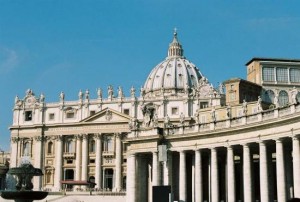The Justmeans
September 22, 2010
http://www.justmeans.com/Black-As-Sin-Vatican-Bank-Accused-Of-Money-Laundering/31884.html
 |
Yesterday, in a surprising turn of events, Italian authorities announced that they are investigating the Vatican Bank, as well as the head of the Vatican Bank, for money laundering. Police, tipped off by the Bank of Italy, have frozen 23 million euros ($30.21 million) of the Vatican funds, and placed Ettore Gotti Tedeschi, who has been at the helm of the bank for a year, as well as a number of other executives, under investigation. Ettore Gotti Tedeschi is reported to be a member of Opus Dei. Rome magistrates Nello Rossi and Stefano Fava are currently leading the case. Reports out of Italy indicate that the Bank of Italy identified two suspicious Vatican Bank transactions that did not appear to comply with the country's anti-money laundering requirements. Interestingly, when the Bank of Italy informed legal authorities of the transactions, judicial authorities informed the Bank that an investigation into purported money laundering by the Papal body was already underway. Immediately following the allegations disclosure, the Vatican responded, saying that it was "perplexed and baffled by the prosecutors actions. In their words, the Vatican as a whole aims for "complete transparency" in its financial operations. While none of the allegations have been proven, the charges bring up a number of interesting questions. Should the financial arms of non-public religious organizations such as the Vatican be regulated the same, or differently, than other public and private business entities? How should these regulations be operationalised, particularly when the operations of the Vatican & the Catholic Church (as well as many other major religious organizations), are not publicly disclosed (and the institution itself has no obligation to share its financial data)? If the allegations are true, how does one go about punishing the leadership of a a religious institution when its leaders and business arms have essentially been granted diplomatic immunity? And finally, why are we so shocked by these allegations? Is it impossible to believe that a religious institution could be guilty of similar charges?
 |
After the allegations surfaced, the Vatican released an official press release. It noted that it continues to have "full trust" in Ettore Tedeschi, the head of the bank, which is officially known as the Istituto per le Opere di Religione. It also firmly rejected the claims, noting that simple administrative errors could be to blame. While the statements and explanations were reassuring, one continuous challenge surrounds the verification of facts. According to banking experts, the Vatican Bank is "the most secret bank in the world, and it is extremely difficult to find out how much money it controls, the scope of its financial operations, and its transaction history. Like many religious institutions, the Vatican Bank has no obligation to open its operations to external scrutiny. With this fact, it is virtually impossible to find out how much money the Vatican bank controls, or how it is using it. One item that few disagree on is the scope of the bank's assets, particularly physical assets. The Vatican's sources of income include its vast real estate holdings, and no single listing is available that consolidates the value of those land holdings. Over the next couple of weeks, it will be interesting to see how this saga unfolds, particularly as the Vatican and the Pope face increased pressure stemming from the child abuse scandal that has recently resurfaced. Moreover, one critical source of ambiguity regarding the investigation is jurisdiction. As was eluded to earlier, it is not entirely clear how much legal authority Italian officials have over the Vatican Bank, since the Vatican is technically a sovereign state. In fact, in 2009, an effort by Holocaust survivors to sue the Vatican Bank in the United States failed when a U.S. court ruled that the Vatican Bank had "sovereign immunity" and was not subject to lawsuits filed in the United States. According to Vatican history, the Bank was created by an order of the pope "to carry on activities that are for pious causes." It accepts deposits only from top Catholic Church officials and entities, and uses its funds "for designated pious purposes" and is "an autonomous pious foundation." Unfortunately, what those designations mean, and what causes are pious, remain undefined. The bank is ultimately overseen by a commission of five cardinals -- the top position in the Vatican hierarchy below the pope -- which is headed by the Vatican secretary of state. Currently, despite operating as a separate state, Italian authorities continue to subject the bank to anti-money laundering regulations. These regulations exist because Italian law does not consider it to be operating within the European Union.
Any original material on these pages is copyright © BishopAccountability.org 2004. Reproduce freely with attribution.